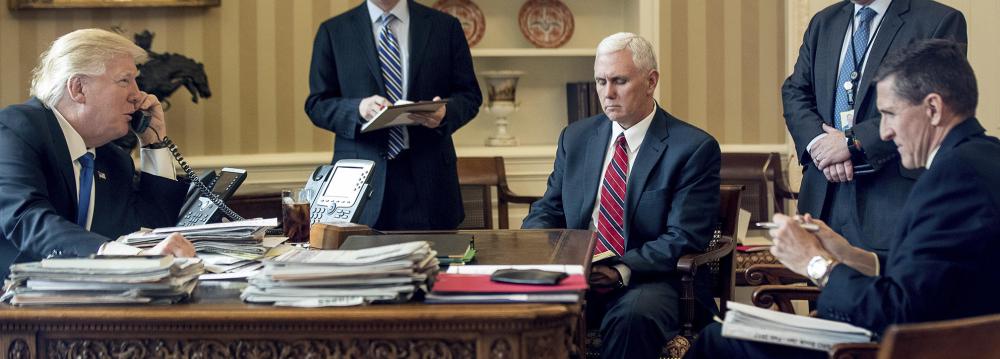Just six days into his presidency, Donald Trump was informed his national security adviser had misled his vice president about contacts with Russia.
Trump kept his No. 2 in the dark and waited nearly three weeks before ousting the aide, Michael Flynn, citing a slow but steady erosion of trust, White House officials said on Tuesday.
Flynn was interviewed by the FBI about his telephone conversations with Russia’s ambassador to the US, a sign his ties to Russia had caught the attention of law enforcement officials, AP reported.
But in the White House’s retelling of Flynn’s stunning downfall, his error was not that he discussed US sanctions with the Russian before the inauguration—a potential violation of a rarely enforced law—but the fact that he denied it for weeks, apparently misleading Vice President Mike Pence and other senior Trump aides about the nature of the conversations.
White House officials said they conducted a thorough review of Flynn’s interactions, including transcripts of calls secretly recorded by US intelligence officials, but found nothing illegal.
Pence, who had vouched for Flynn in a televised interview, is said to have been angry and deeply frustrated.
“The evolving and eroding level of trust as a result of this situation and a series of other questionable incidents is what led the president to ask General Flynn for his resignation,” White House Spokesman Sean Spicer said on Tuesday, one day after the president asked Flynn to leave.
Flynn, in an interview with The Daily Caller News Foundation, said on Monday “there were no lines crossed” in his conversations with Russian Ambassador Sergey Kislyak.
The explanation of the episode left many questions unanswered, including why Trump did not alert Pence to the matter and why Trump allowed Flynn to keep accessing classified information and taking part in the president’s discussions with world leaders up until the day he was fired.
White House officials also struggled to explain why Trump counselor Kellyanne Conway had declared the president retained “full confidence” in Flynn just hours before the adviser had to submit his letter of resignation.
2nd Blow to Trump Administration
Later Tuesday, The New York Times reported that US agencies had intercepted phone calls last year between Russian intelligence officials and members of Donald Trump’s 2016 campaign team.
Current and former US officials, who spoke to the Times anonymously, said they found no evidence that the Trump campaign was working with the Russians on hacking or other efforts to influence the election.
The White House shakeup, less than one month into Trump’s tenure, marked another jarring setback for a new administration already dealing with tensions among top aides and a legal fight over the president’s travel ban order.
Flynn’s firing also heightened questions about the president’s friendly posture toward Russia. Democrats called for investigations into Flynn’s contacts and Republican Sen. Lindsey Graham said Congress needed to know whether he had been acting with direction from the president or others.
Trump initially thought Flynn could survive the controversy, according to a person with direct knowledge of the president’s views, but a pair of explosive stories in The Washington Post in recent days made the situation untenable.
As early as last week, he and aides began making contingency plans for Flynn’s dismissal, a senior administration official said. While the president was said to be upset with Flynn, he also expressed anger with other aides for “losing control” of the story and making his young administration look bad.
A US official told AP that Flynn was in frequent contact with Kislyak on the day the former administration slapped sanctions on Russia for election-related hacking, as well as at other times during the transition.
Spicer said Flynn was not discussing sanctions at the president’s behest.


